Premier is a title for the head of government in central governments, state governments and local governments of some countries. A second in command to a premier is designated as a deputy premier.

The Herzegovina-Neretva Canton is one of 10 cantons of the Federation of Bosnia and Herzegovina in Bosnia and Herzegovina.

The Federation of Bosnia and Herzegovina is one of the two entities composing Bosnia and Herzegovina, the other being Republika Srpska. The Federation of Bosnia and Herzegovina consists of ten autonomous cantons with their own governments and legislatures.
The presidency of Bosnia and Herzegovina is a three-member body which collectively serves as head of state of Bosnia and Herzegovina. According to Article V of the Constitution of Bosnia and Herzegovina, the presidency comprises three members: one Bosniak, one Serb, and one Croat. The Bosniak and Croat members are elected from a joint constituency in the Federation of Bosnia and Herzegovina, whilst the Serb member is elected from voters in Republika Srpska.
The Council of Ministers of Bosnia and Herzegovina, often called Bosnian Government, is the executive branch of the government of Bosnia and Herzegovina. It is also called the Cabinet.

Canton 10, also known as the Herzeg-Bosnian Canton, is one of the ten cantons of the Federation of Bosnia and Herzegovina, a political entity of Bosnia and Herzegovina. It is the largest canton by area and eighth by population. The local government seat is in Livno, while the assembly is in Tomislavgrad.

The Socialist Republic of Bosnia and Herzegovina, commonly referred to as Socialist Bosnia or simply Bosnia, was one of the six constituent federal states forming the Socialist Federal Republic of Yugoslavia. It was a predecessor of the modern-day Bosnia and Herzegovina, existing between 1945 and 1992, under a number of different formal names, including Democratic Bosnia and Herzegovina (1943–1946) and People's Republic of Bosnia and Herzegovina (1946–1963).

Krešimir Zubak is a Bosnian Croat politician who served as the 1st Croat member of the Presidency of Bosnia and Herzegovina from 1996 to 1998. At the beginning of the Bosnian War in 1992, he joined the Croatian Democratic Union.
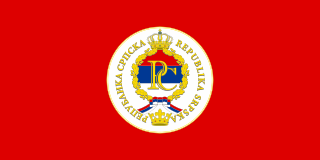
The president of Republika Srpska is the highest executive authority in Republika Srpska, an entity in Bosnia and Herzegovina. It is one of the executive authorities, along with the Government of Republika Srpska. The president of Republika Srpska is directly elected for a term of four years, along with two vice presidents from different constituent nations. None of them can be from a same constituent nation at the same time. The president's residence is in Banja Luka.
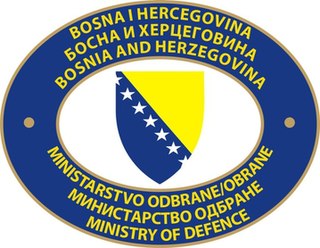
The Ministry of Defence of Bosnia and Herzegovina is the governmental department in charge of the Armed Forces of Bosnia and Herzegovina and protection of Bosnia and Herzegovina from invasion and threats.

The chairman of the Council of Ministers of Bosnia and Herzegovina is the head of the government of Bosnia and Herzegovina.
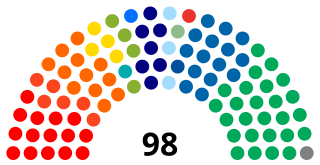
The House of Representatives of the Federation of Bosnia and Herzegovina is one of the two chambers of the Parliament of the Federation of Bosnia and Herzegovina, with the other being the House of Peoples of the Federation of Bosnia and Herzegovina. The chamber consists of 98 members which are elected by party-list proportional representation.
Government of Republika Srpska is the executive authority of Republika Srpska, along with the President of Republika Srpska. The Prime Minister is head of the Government, while the Government is composed of his deputies and ministers. The powers of the Government are determined by the Constitution of Republika Srpska. The Government is appointed by the National Assembly for a four-year term.

The Parliament of the Federation of Bosnia and Herzegovina is the bicameral legislative body of the Federation of Bosnia and Herzegovina, one of two entities of Bosnia and Herzegovina. It consists of the following two chambers.

The House of Peoples of the Federation of Bosnia and Herzegovina is one of the two chambers of the Parliament of the Federation of Bosnia and Herzegovina, with the other chamber being the House of Representatives of the Federation of Bosnia and Herzegovina. Federal laws need to be passed by both houses.

The Radio-Television of the Federation of Bosnia and Herzegovina is entity level public broadcaster which operates own radio and television services in the Federation of Bosnia and Herzegovina entity.
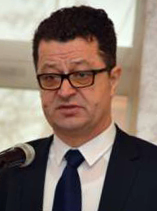
Martin Raguž is a Bosnian Croat politician who served as Chairman of the Council of Ministers of Bosnia and Herzegovina from 2000 to 2001. He was a member of both the national House of Representatives and House of Peoples.

The Croat federal unit in Bosnia and Herzegovina, or Croat entity, also informally known as the third entity, is a proposed administrative unit in Bosnia and Herzegovina based on territorial federalism and ethnic self-determination. The proposal has been invoked by several political scientists, politicians and political parties, including the Croat National Assembly. So far it has not been discussed beyond the concept level. Since the country is divided into two entities, the Serb-dominated Republika Srpska and the Bosniak-majority Federation, Croats, as one of the three equal constitutive nations, have proposed creating a symmetrical Croat-majority territorial unit. Political advocates for such proposal argue it would ensure Croat equality and prevent electoral gerrymandering, simplify the political gridlock while dismantle overburdening administration. Opponents argue it would further divide the country on ethnic grounds thus breaching the constitutional principles, put non-Croats in a subordinate position, and lead to separatism.
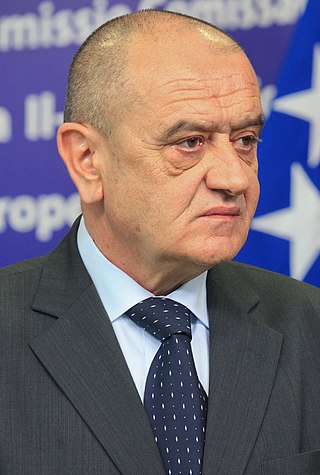
The Eleventh Council of Ministers of Bosnia and Herzegovina was the Council of Ministers of Bosnia and Herzegovina cabinet formed on 12 January 2012, following the 2010 general election and the one-year governmental formation crisis. It was led by Chairman of the Council of Ministers Vjekoslav Bevanda. The cabinet was dissolved on 31 March 2015 and was succeeded by a new Council of Ministers presided over by Denis Zvizdić.

Constitutional Court of the Federation of Bosnia and Herzegovina(Serbo-Croatian: Ustavni sud Federacije Bosne i Hercegovine) was established by the Constitution of the Federation of Bosnia and Herzegovina entity in Bosnia and Herzegovina, which guarantees its respect and implementation. The operation is based on the provisions of the Constitution of the Federation and the Law on Procedure before the Constitutional Court of the Federation of Bosnia and Herzegovina. Its seat is in Sarajevo.















